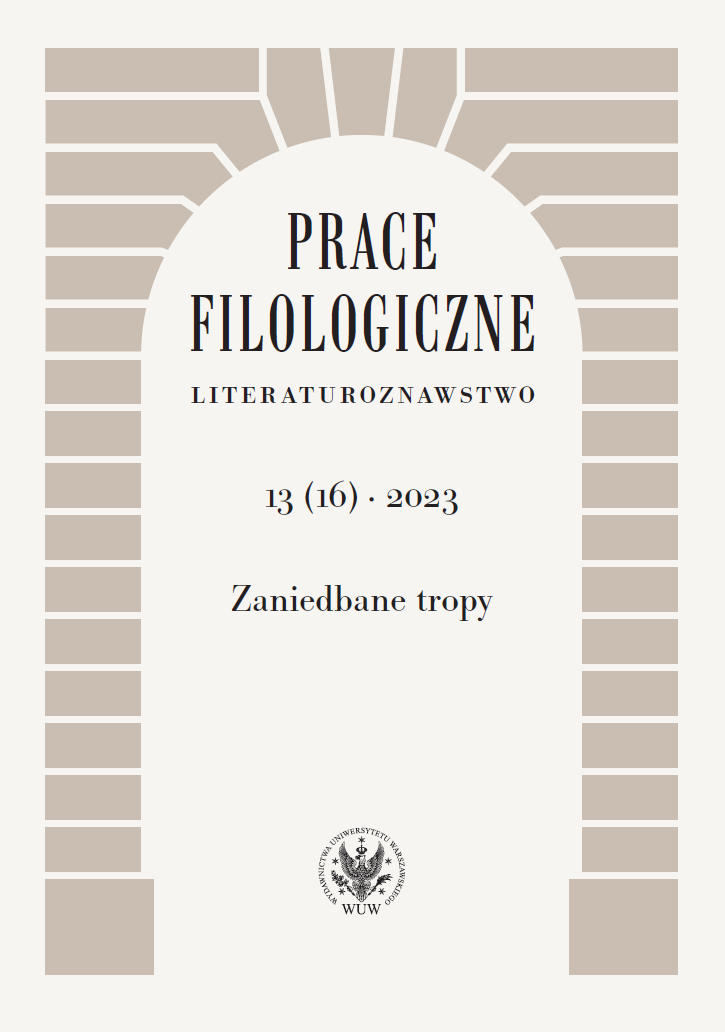W gościnie i u siebie. Karol Irzykowski w „Skamandrze”, „Ponowie” i „Krokwiach”
Being a Guest and the Host: Karol Irzykowski’s Contribution to “Skamander”, “Ponowa” and “Krokwie”
Author(s): Radosław Okulicz-KozarynSubject(s): Language and Literature Studies, Studies of Literature, Polish Literature
Published by: Wydawnictwa Uniwersytetu Warszawskiego
Keywords: interwar period; avant-garde literary movements; Young Poland movement; the Skamandrites; the authors of Ponowa; programophobia; Krokwie; constructionalism
Summary/Abstract: Between 1919 and 1922, Karol Irzykowski took up collaboration with three literary journals: "Skamander", "Ponowa" and "Krokwie". Despite the fact that each time the circumstances and the course of this collaboration were different, the motivation remained similar. The critic, who lived in Warsaw after World War I, tried not only to familiarise himself with the new rapidly developing poetic trends, but also influence them. Irzykowski believed that these trends were an unconscious continuation of the pre-war avant-garde ideas and experiments which he himself had actively taken part in. For this reason, he collectively referred to the Skamandrites and their "Ponowa" adversaries as ‘Najmłodsza Polska’ [The Youngest Poland]. Karol Irzykowski required from poets the highest artistic awareness which was supposed to express itself not only in their literary works, but also in their programmes, hence “Programofobia,” Irzykowski’s acclaimed polemical article where he voiced his reaction to the reluctance to formulate artistic programmes, which was characteristic of "Skamander" authors. "Ponowa" authors, on the other hand, were appreciated for the programme-formulating inclinations, but criticised for their practices. Despite the fact Irzykowski sat on the editorial committees of both journals, he openly expressed his reservations about their approaches and content which made him quite a peculiar senior reviewer and this, on the other hand, provoked ironic and malicious reactions on the part of younger authors. Irzykowski’s collaboration with "Krokwie", a periodical founded by Roman Zrębowicz and successfully cultivating the tradition of "Chimera", followed a different path. The circle of writers it gathered attempted to promote the concept that had already been developed in pre-war Lwów, called ‘constructionalism.’ The critic, who at that time had actively been engaged in Constructionalists’ endeavour, supported their initiatives after the war as well. In their journal, he published materials that were particularly valuable to him, i.e. the poems of his deceased friend Stanisław Womela and the essay “Alchemia ciała” [The Alchemy of the Body]. It can be assumed that Irzykowski pinned his hopes on "Krokwie" with a view to developing his own artistic creation, for which he did not find a convenient place in "Skamander" and "Ponowa". Unfortunately, soon after two issues of "Krokwie" had been published, Zrębowicz had to put an end to publishing his journal.
Journal: Prace Filologiczne. Literaturoznawstwo [PFLIT]
- Issue Year: 2023
- Issue No: 13 (16)
- Page Range: 293-308
- Page Count: 16
- Language: Polish

